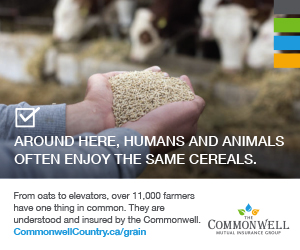Research Roundup
FIND OUT WHAT’S NEW IN THE WORLD OF RESEARCH
Soybeans in your sandwich wrap
Rebecca Hannam
Using Ontario soybeans to create plastic film products is just one more opportunity exciting bean producers these days, says a University of Guelph researcher.
Dr. Peter Pauls, Department of Plant Agriculture, is extracting protein from soybean meal to create a plastic-like film (similar to sandwich wrap). The soymeal proteins are mixed with glycerol and water and then dried. The result is a clear, flexible plastic-like film.
Pauls and other researchers are making films from various bean varieties, each with different protein compositions. The films are tested for their elasticity and strength using an instrument that stretches them until they break. The researchers hope to determine the relationship between soybean protein composition and function.
Food packages, pharmaceutical capsules, medical bandages and dissolving breath strips are among the list of products that could be made.
“The more uses we find for commodities, the more opportunities there will be for producers to sell crops at decent prices,” says Pauls.
Findings will be shared with plant breeders to encourage the breeding of varieties suitable for producing plastic. •
Getting ready for glyphosate resistant fleabane’s arrival
Alycia Moore
A potentially invasive weed species is being watched closely by researchers who want to understand its germination and emergence – and how to control it – before it arrives.
Weed scientists at the University of Guelph have launched the first study on fleabane in winter wheat. This is a winter annual weed which isn’t yet widely understood, although historically it’s been quite difficult to control.
Fleabane is common in Ontario and can spread easily by wind. Now, a glyphosate resistant fleabane is worrying the farm community. It’s prevalent throughout the US, especially in the Northeast, but has not been found in Ontario — yet.
Researchers here hope to pre-empt the arrival of glyphosate-resistant fleabane biotypes by gaining a better understanding of the species nature and potential alternative management approaches.
“Fleabane emerges in both the fall and the spring, so we’re exploring what the appropriate conditions are for fall versus spring emergence,” says Dr. Rene Van Acker from the Department of Plant Agriculture who is conducting this study along with graduate student Eric Tozzi.
They will also study how late fall seedlings can emerge and how emergence timing affects overwintering success, and how long the seeds remain viable in the field. They’ll have data available by next summer as well as preliminary recommendations for fleabane management. •
Soil health, red clover affects productivity
Katharine Tuerke
Proper rotation and red clover as an under-seed can improve soil health and sustain strong corn production. They will also study how late fall seedlings can emerge and how emergence timing affects overwintering success, and how long the seeds remain viable in the field. They’ll have data available by next summer as well as preliminary recommendations for fleabane management.
Dr. Bill Deen, from the University of Guelph’s Department of Plant Agriculture, is using the long-term crop rotation trial of corn, soybeans and wheat to identify factors that improve red clover establishment uniformity.
“Uniform red clover establishment could significantly increase yield and reduce nitrogen costs for Ontario corn producers,” says Deen.
He’s also using the long-term rotation trial to develop and evaluate a simple soil quality test that’s relevant to Ontario. The test would identify optimal physical, biological and chemical soil properties associated with high crop productivity. External groups would work with farmers to establish baseline values and monitor how soil health is affected by the crop management practices.
Deen says understanding the role of management practices on soil health, such as rotation and use of red clover, may enable growers to increase corn performance and yield potential. •
Research Roundup is provided by members of SPARK (Students Promoting Awareness of Research Knowledge) at the University of Guelph’s Office of Research. For more information, contact a SPARK writer at 519-824-4120, ext. 52667.








